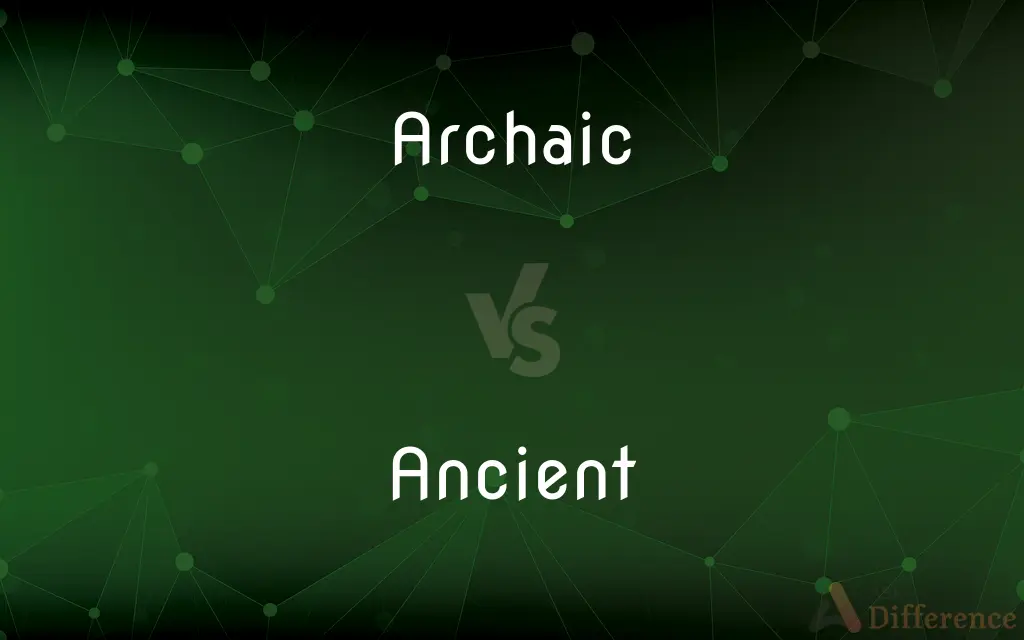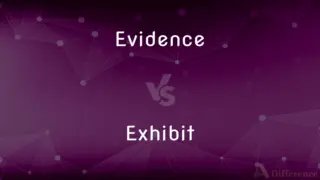Archaic vs. Ancient — What's the Difference?

Difference Between Archaic and Ancient
ADVERTISEMENT
Compare with Definitions
Archaic
Also Archaic Relating to, being, or characteristic of a much earlier, often more primitive period, especially one that develops into a classical stage of civilization
An archaic bronze statuette.
Archaic Greece.
Ancient
Belonging to the very distant past and no longer in existence
The ancient civilizations of the Mediterranean
Archaic
No longer current or applicable; antiquated
Archaic laws.
Ancient
An old man
A solitary ancient in a tweed jacket
Archaic
Relating to, being, or characteristic of words and language that were once in regular use but are now relatively rare and suggestive of an earlier style or period.
ADVERTISEMENT
Ancient
A standard, flag, or ensign.
Archaic
Relating to or being an early or premodern evolutionary form of an organism or group of organisms
Archaic vertebrates.
Ancient
Of, relating to, or belonging to times long past, especially before the fall of the Western Roman Empire (AD 476)
Ancient cultures.
Archaic
Relating to or being an early form of Homo sapiens or a closely related species, such as Neanderthal, that is anatomically distinct from modern humans.
Ancient
Of great age; very old
"The males live up to six months—positively ancient, for a bee" (Elizabeth Royte).
Archaic
Archaic Relating to a Native American culture prevalent throughout much of North America from about 8000 BC to about 1000 BC, characterized especially by the development of Mesolithic tools and by the increased reliance on smaller game animals as the large Pleistocene mammals became extinct.
Ancient
(Archaic) Having the qualities associated with age, wisdom, or long use; venerable
"You seem a sober, ancient Gentleman by your habit" (Shakespeare).
Archaic
A member of an archaic population of Homo.
Ancient
A very old person.
Archaic
A general term for the prehistoric period intermediate between the earliest period (‘[http://en.wikipedia.org/wiki/Paleo-Indian Paleo-Indian]’, ‘Paleo-American’, ‘American‐paleolithic’, &c.) of human presence in the Western Hemisphere, and the most recent prehistoric period (‘Woodland’, etc.).
Ancient
A person who lived in times long past.
Archaic
(paleoanthropology) (A member of) an archaic variety of Homo sapiens.
Ancient
The peoples of the classical nations of antiquity.
Archaic
Of or characterized by antiquity; old-fashioned, quaint, antiquated.
Ancient
The ancient Greek and Roman authors.
Archaic
(of words) No longer in ordinary use, though still used occasionally to give a sense of antiquity and are still likely to be understood by well-educated speakers and are found in historical texts.
Ancient
(Archaic) An ensign; a flag.
Archaic
(archaeology) Belonging to the archaic period
Ancient
(Obsolete) A flag-bearer or lieutenant.
Archaic
Of or characterized by antiquity or archaism; antiquated; obsolescent.
Ancient
Having lasted from a remote period; having been of long duration; of great age, very old.
An ancient city
An ancient forest
Archaic
So extremely old as seeming to belong to an earlier period;
A ramshackle antediluvian tenement
Antediluvian ideas
Archaic laws
Ancient
Existent or occurring in time long past, usually in remote ages; belonging to or associated with antiquity; old, as opposed to modern.
An ancient author
An ancient empire
Archaic
Little evolved from or characteristic of an earlier ancestral type;
Archaic forms of life
Primitive mammals
The okapi is a short-necked primitive cousin of the giraffe
Ancient
(history) Relating to antiquity as a primarily European historical period; the time before the Middle Ages.
Ancient
(obsolete) Experienced; versed.
Ancient
(obsolete) Former; sometime.
Ancient
A person who is very old.
Ancient
A person who lived in ancient times.
Ancient
One of the senior members of the Inns of Court or of Chancery.
Ancient
(obsolete) A senior; an elder; a predecessor.
Ancient
A flag, banner, standard or ensign.
Ancient
The bearer of a flag; ensign
Ancient
Old; that happened or existed in former times, usually at a great distance of time; belonging to times long past; specifically applied to the times before the fall of the Roman empire; - opposed to modern; as, ancient authors, literature, history; ancient days.
Witness those ancient empires of the earth.
Gildas Albanius . . . much ancienter than his namesake surnamed the Wise.
Ancient
Old; that has been of long duration; of long standing; of great age; as, an ancient forest; an ancient castle.
Remove not the ancient landmarks, which thy fathers have set.
An ancient man, strangely habited, asked for quarters.
Ancient
Known for a long time, or from early times; - opposed to recent or new; as, the ancient continent.
A friend, perhaps, or an ancient acquaintance.
Ancient
Dignified, like an aged man; magisterial; venerable.
He wrought but some few hours of the day, and then would he seem very grave and ancient.
Ancient
Experienced; versed.
Though [he] was the youngest brother, yet he was the most ancient in the business of the realm.
Ancient
Former; sometime.
They mourned their ancient leader lost.
Ancient
Those who lived in former ages, as opposed to the moderns.
Ancient
An aged man; a patriarch. Hence: A governor; a ruler; a person of influence.
The Lord will enter into judgment with the ancients of his people, and the princes thereof.
Ancient
A senior; an elder; a predecessor.
Junius and Andronicus . . . in Christianity . . . were his ancients.
Ancient
One of the senior members of the Inns of Court or of Chancery.
Ancient
An ensign or flag.
More dishonorable ragged than an old-faced ancient.
Ancient
The bearer of a flag; an ensign.
This is Othello's ancient, as I take it.
Ancient
Belonging to times long past especially of the historical period before the fall of the Western Roman Empire;
Ancient history
Ancient civilizations such as those of the Etruscans and Sumerians
Ancient Greece
Ancient
Very old;
An ancient mariner
Share Your Discovery

Previous Comparison
Evidence vs. Exhibit
Next Comparison
Pass vs. Give















































